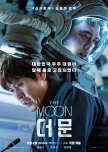
Filming standard à la Hollywood meets melodramatic narrative, emotionally firmly rooted in SK soil
“The Moon” could have easily been titled “The Dark Side of the Moon”. At least we as audience learn quite something about it... But it's actually about much more. The KMovie is delivering action within the high-tech world of space travel. On top of that it is touching, thought-provoking and thus gnawing at fundamental, existential and political questions, too. We get a remarkably balanced production between ´international´ filming standards à la Hollywood and a melodramatic narrative with its emotional roots firmly planted in South Korean soil. So eventually, this lunar expedition is neither/nor, as this KMovie offers something in between. For hard-core fans of Hollywood blockbusters it might be offering too much melodrama. For the hard-core KMovie fan it might not be enough. Well, I simply enjoyed it as the lunar expedition as it is.The focus is on the ambitious national program that South Korea has recently set up in terms of space research (you may check side note below). With its technological innovations, South Korea is starting to present itself as an increasingly self-confident G7 space power. That is where this story is coming from. And it is against this background that the particularly high level of filmmaking effort must be seen, by which the experience of space is brought almost hyper-real within the audience's grasp.
The special ambience is staged first-class thanks to the applied highly developed audiovisual filming technology and expertise. Seemingly, the production team has spared no effort or expense - with 3D rig camera recordings, premium HDR video technology, Dolby Cinema technology (for the first time in a KMovie), innovative spatial audio technology and sophisticated rendering processes for the finest color nuances. The demand was for high-end cinema quality. And it is surely impressive. Everything in this distant, highly technological, alien world, far way within the orbit of the moon, comes as close to the audience as it can get.
Despite the enormous spatial distance, dense emotional intensity is provided, even though the protagonists are located so far away from each other. This delicate emotional bridging, requiring high-end performance skills, has been the big challenge on the actors´ side. In addition to the proven, first-class veterans Sol Kyung-gu and Kim Hee-ae on the ground at the rather clinically clean setting with high-tech computers and screens of both Aerospace Centres Naro and NASA, especially Doh Kyung-soo (D.O.) offered magnificent top performance as an astronaut lost in space. Mainly those three create and maintain an impressively emotional density (in addition to the overall action).
The plot of "The Moon" revolves around South Korea´s international profile as capable space power, while the eyes of the world are set on their (fictive) second trial of a manned lunar mission. Whereas unfortunately it didn't work out the first time... It's also about politics and tons of money. And in the end, it's all about survival... or rather, whether a human's life in the face of groundbreaking missions for humankind is worth ignoring chains of command, nationalities and costs.
Breathless action on unusual terrain. Intense scenes in an isolated space capsule 380,000 km away from earth, surrounded by darkness and severe cold. Desperate helplessness. The struggle for the 'right' decision – what´s actually the measure of what is right? Maybe ultimately just what I can live with in the end?
----------------------------------------------------------------
SIDE NOTE: --- KSpace ---
Korean movie oder drama productions set in space have so far been few, and for good reason. The KMovie “The Moon” from 2023 as well as i.e. the KDramas “The Silent Sea” (from 2021) and “Ask the Stars” (planned for 2023) are, so to speak, a start. They reflect current (or better: hoped for further) developments regarding KSpace.
After rather unsuccessful endeavors at the beginning of the new millennium, South Korea as the 13th country to have its own space center by now, is increasingly well positioned in the KSpace segment. 2021 was marking the first attempt to launch their own test satellites into the orbit by their launch vehicle Nuri, which had been developed over the past ten years. Yet it failed. Nevertheless, in 2022 and 2023 it succeeded at last. Three more Nuri launch vehicles are already scheduled to be launched into orbit by 2027. According to the plans of the country and the Korea Aerospace Research Institut (KARI) at Naro space center, South Korean spacecraft will be collecting data on the moon in 2032 already. Additionally, the country has Mars scheduled for 2045.
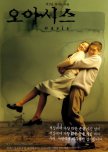
Thought provoking. Confronting the arrogance of the ´normal´. Truly outstanding acting performance
"Oasis" was highly celebrated by international film critics in 2002. Director and screenwriter Lee Chang-dong, who had with "Peppermint Candy" in 1999 already contributed a milestone in Korean film art, came up with this unusual love story between a mentally retarded young man and a young woman with infantile cerebral palsy. In doing so, he once again relied on Sol Kyung-gu and Moon So-ri, who had proven themselves as a couple in "Peppermint Candy" and who now once again deliver truly outstanding acting performances in "Oasis". The list of international awards – i.e. in Venice, Vancouver, Bergen, Brisbane, Seattle and Seville - as well as in South Korea, is long. And rightly so.“Oasis” is pure (independent) KMovie! It impressively embodies a great strength of South Korean movie production: ruthlessness! Even if social life is characterized by facades, coats, make-up and social reputations, modern South Korean cinema has (since the end of dictatorial censorship) proven what 'independence' really means. The freedom to finally show things the way they really are! Not being afraid of what is hurting, what is ugly, what is disgusting! The brutal revelation of the emotional abyss to which the human soul may be exposed over the course of a human life. Situations and moments in life that people tend/wish to quickly forget. The cruelties that people are capable of inflicting on each other. The look behind the facades and underneath the coats, where we are naked and without make-up, alone and vulnerable. But this is where we are sincere and real, too. From there, a new form of beauty and strength can grow. KMovies bring to light even the unloved, unpleasant, repressed, despised, perverted, uninhibited, disturbing human emotions with magnificent intensity, which are often presented so authentically that it hurts (because it's so true). The protagonists have no claim whatsoever to be likeable. This creative courage, when it comes to production and performance, as well as the audience´s willingness to open up to these cinematic works is (in my opinion) almost unique.
“Oasis” offers an impressive expression of this particular artistic attitude. This is a thought provoking KMovie confronting the arrogance of the ´normal´. The plot is about a young woman and a young man who – in the eyes of their social environment - preferably should be socially isolated and actually locked away, as they are supposedly unpresentable. Because of their disability, they are ultimately just a nuisance, causing work and trouble, irritating the 'normal' people with their unpredictable behavior, and actually not contributing anything... Because the families are ashamed of them.
The KMovie bluntly frames that social norms are in fact more important to 'us' than people. "Oasis" encourages to open up a bit and approach the lives of those 'waywards'. And lo and behold! They are sensitive, soulful people like 'us' - with feelings, dreams and longings. They are falling in love. They long for relationships. They are just people, too. Lovable people. Adults with their own lives.
'He' is a physically healthy man in his late 20s, but at the mental level of an 8 year old. He is strong, but easy to manipulate and rather simple-minded. 'She', on the other hand, is physically handicapped due to her severe infantile cerebral palsy to such an extent that she is dependent on help. Due to the impairment of her nervous system, which affects voluntary motor skills, speech disorders, spasms, as well as sensory and motor limitations are occurring, too. Intelligence isn't actually her problem, but that young woman in "Oasis" apparently wasn't given any specific assistance, just basic care. She has her difficulties communicating.
The way the families treat their ´waywards´ is horrendous. In fact, they are both unscrupulously exploited and abused. And both are helpless in their own ways. He doesn't fully grasp the situation. She is physically dependent on helping hands.
The romantic relationship between the two is quite something else. Their start can be considered downright dubious. And yet, as the odd couple they are, they both are happy together. The picture of the oasis on the wall jumps out of its frame and fills the room. In their togetherness, the couple has created an almost magic space where their souls can relate and recharge, where they can be a different person. It is touching, indeed. ´He´ is a responsible man and she is a desirable woman! Yet, this reality is completely alien to their social environment. The families don't have the slightest idea, that this could be even possible: those two ´handicapped losers´ being actually able to genuinely caring for each other and loving each other just the way they are. Not even their closest families honestly tried to truly reach out and attempt to understand their brother/sister.
Bringing the quality of this relationship against all odds authentically to the audience is the unique beauty and strength of “Oasis”. Although 'beauty' is not otherwise something, one would directly associate with this movie. There is hardly any beauty in the world of those two protagonists, where their environment isn´t taking them serious at all. They are either patronized or treated in a disrespectful and disdainful manner. Nevertheless, their feelings for each other radiate beauty and grace. Interaction may inevitably be rather awkward, but still they find their unique way. In the end, it all comes to an almost passionately brilliant finale when HE risks everything in order to by all means keep his promise to HER: sawing off the branches of the tree in front of her window, which only cast shadows on her beloved oasis picture on the wall...
The KMovie leaves us with our thoughts behind. Touched. And - substitutional for those two families, the police, the neighbors etc., who in their arrogance are blind to the inner world of those two lovers – ashamed, too.
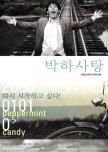
Not nice to watch but definitely worth seeing. Superbly done in many ways. Powerful. Resonating.
Prolog:The conclusion for the protagonist in his late 30s is rather tragic: he´s getting the urge to go back. He wants the life of his late youth back. He cannot continue with who he is today. For him, there is only one option remaining – a shortcut to the exit.
However, for the audience, the end is actually the beginning. The journey goes backwards in seven chapters. And when we finally reach the start, it actually makes sense to look at the ending again... (in movie-terms: its beginning...)
-------------------------------------------------- ----
“Peppermint Candy” was one of the top ten movies in 2000. The international awards it collected are respectable. And even in 2022, “The Guardian” has it listed in 12th place among South Korean film classics. Meaning: It was topical back then and still hasn’t lost its impact. It´s cult. It can be considered particularly valuable. However, it´s not particularly nice, though. Rather particularly powerful and ferociously intense.
"Peppermint Candy" dates from 1999. It tells the story of the previous two decades of South Korean history using the example of an arbitrary, inconspicuous individual. For audience who isn´t firm in recent South Korean history, the KMovie may be reduced to the protagonist as an individual - to his very personal story and his tragic ending. For all those who know something about the historical, social background (see the side note below if you like), the KMovie becomes a memorial on screen that commemorates all those in society who were probably thus affected in one way or another, too, and may have had a similar experience. And there were quite a few.
In 1999, South Korea looked back on two extremely eventful decades. Two decades that were endured, sustained, borne by the people... Two decades that, in addition to democracy, turbo-capitalism and material prosperity, also produced a whole series of psychological cripples.
I actually don't like the word 'cripple', but somehow it seems appropriate in this case, here in the sense of: people who were maltreated by others or 'by life´s circumstances' to the point of psychic unconsciousness (even if perhaps they themselves were involved as perpetrators, too). People who were broken by their fate and trauma, not being allowed to and/or able to talk about it. People who fell, lost themselves, could no longer get back on their feet, feeling helpless. Completely bent. People who could not find peace with their shame and guilt. In their inability to communicate about it and get help, they became a total human failure for those around them.
In reverse "Peppermint Candy" portrays the career of such a psychological (and physical) 'cripple' in intense scenes. We may acknowledge the individual fate. Even without historical background and regardless of socialization, we acknowledge a broken soul, of which all that is left to the outside world is actually an 'asshole'. Once a poetic, delicate, sensitive spirit... it´s hard to believe. Actor Sol Kyung-gu expands the entire range of his skills, convincingly and uncompromisingly drawing the audience into each of his divers crucial, rather unpleasant emotional life situations.
“Peppermint Candy” is superbly done in many ways. Not too much, not too little. Ruthless. And in pointed, symbolic imagery, the scenes gain in emotional power and meaningfulness as they progress - even after we have travelled a few sequences further (back) - to the extent that the puzzle of drastic life events accumulated are coherently put together into a pile of shards.
The protagonist in "Peppermint Candy" is experiencing the significant historic events of his generation at the forefront. His psychical downward spiral cannot be stopped. But this protagonist is no exception. Countless people in their late thirties in South Korea in 1999 could have told such or similar stories. During those traumatizing two decades the public was carelessly left alone to individually deal with what had happened. What a person experienced emotionally, what a person had to process and couldn't, the decisions made, the guilt, the shame, the pain – the answer to that was mainly psychological repression and silence about it. The consequences in everyday life: Outbursts of acting up and/or apathy. Sometimes the old wound hurts again. The old wound makes man fall to the ground, by its pain that he cannot escape. But it is also a phantom pain - the desperate suffering over an essential piece of 'who I am' that was taken away once and for all...
The protagonist in "Peppermint Candy" suffers on behalf of an entire generation of anonymous young people who were quietly worn down, deeply psychologically shattered and finally by the two decades of the 80s and 90s, the time of transition from military dictatorship to modern capitalism existentially bankrupt. The KMovie reaches out to all those who may have had a similar experience and/or were able to sympathize. Where communication had been lacking for decades, the KMovie, with its sometimes disturbing insights, tries to build a bridge: with understanding that may even extend to empathy. "Peppermint Candy" manages to connect the South Korean people through the fate of this one fictional man and his personal environment. (Additionally, it may even touch the rest of the world). Yongho, who could be 'anyone', and with him the women in his life, his friends (?), his colleagues and his victims who had crossed his path, who could also be 'anyone'…
Not nice to watch. But definitely worth seeing.
Powerful. Resonating. A convincingly empathetic work.
A work of passion.
--------------------------------------------------------------------------------
SIDE NOTE: --- Brief overview of the historical background of South Korea - regarding May 1980 in Gwangju, the 1980s under repressive police violence, and the years of economic miracle up to the Asian crisis of 1997-1999. ---
May 1980 in Gwangju, South Korea, featured a bloody massacre that the police and military were ordered to carry out on their own people. Yet, that massacre of Gwangju remained an official taboo for almost two decades. What happened in Gwangju back then was kept secret from the rest of the country. Then, the city was deliberately cordoned off. The enemy was officially called 'communism' (especially in student circles, supposedly under the infiltrated influence of North Korea.)
Those who survived May 1980 in Gwangju and perhaps could or would have wanted to talk about it were pressured, persecuted, tortured and put in camps. The others who preferred to remain silent had to figure out by themselves how to emotionally digest what had happend.
President Chun Do-hwan, who succeeded his predecessor Park Chung-hee in the aftermath of the bloody spring of 1980, did not create any less autocratic structures for the common people than before with his dictatorship. On the contrary. With him, brutal torture was carried out in the spirit of a systematic cleansing. The years of Chun Do-hwan's rule were some of the worst for South Korea in terms of political repression. His mission: The country should use all its might to present itself to the rest of the world as dazzling and up-and-coming until the Olympic Games. Whatever/whoever was bothersome was put away. However, the autocratic rule of the dictator and his brutal power apparatus with police and secret service ended in 1987 as a result of unbridled, enormous public pressure. The people's longing for democracy was finally able to prevail.
Parallel to the repression under Chun Do-hwan, the 1980s and following years were characterized by the years of economic miracle. The market became increasingly liberalized and it was all about exports. Yet, on a large scale growth and prosperity were built on credit: direct investments from abroad, credit cards for the people in the country, loan sharks for all those smaller companies that couldn't get the money from the banks. But the bubble of the expansive credit economy of the 1990s burst in 1997 with the Asian crisis. The credit boom was followed by a crash, an enormous fall in the value of the won, a series of bankruptcies, unemployment all over the place and poverty for the many.
Even though South Korea got back on its feet astonishingly quickly in the course of the subsequent years of the so called IMF Economic Crisis, the path was marked by countless fates of bankruptcies and many families suffering from for a long time since.
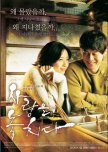
A homage to all those unhappily in love! (Wherever. Whenever.)
I´d say this is a homage to all those unhappily in love! (Wherever. Whenever.)Calm, like the water on windless days. Bare in words, instead told with images, well-placed scene settings and metaphors.
The protagonists are not so good with words, rather insecure and awkward when it comes to sharing their feelings. (But actually, nowhere in the movie is there any role model, whatsoever, from whom they could have learned better - how to deal with feelings openly, sincerely and appropriately.)
The original title was "Lost Love" or "Missed Love". But the international title “Lost in Love” is also appropriate, as the protagonists don´t seem to know how to navigate their feelings of love. This brings us back to the calm – becalm, with no wind to fill the sails. In fact, there is no tension between the protagonists - it is the drama of bad or missing timing in love. It is no coincidence that bus terminals become a structuring leitmotif.
The story of "Lost in Love" is not spectacular. On the contrary, it is the essence of a non-story. A story about a story that just doesn't want to happen. Nevertheless, it goes deep - because it relies on the effect of the blank, on the space between, on what works in the background and constantly gnaws at the heart. And this, actually, is an all too familiar, well known, painful experience for many people. It doesn’t have to be explicit. It is even more precise that way.
The KMovie has nothing to do with a typical RomCom. Nevertheless, "Lost in Love" is poetic in its own way - with an affectionate look at the unfortunate lovers on this earth: their hopes; their fear of self-confidently standing up for their feelings and thus maybe provoking the dreaded, outspoken “No!” or “Go!”; their inability to let go.
Water is the leitmotif in several ways. There is the rowing school and the fish farm representing dynamism and movement. And then there is the rain and the tears, shed or non-shed. But “Lost in Love” is also expressly colorful. With an eye for the banal details in everyday life. Authentic. Without makeup. The smell and the humid air of the monsoon summer are almost penetrating through to the audience. The landscape was handpicked, the radiant nature representing the beauty of life - even despite being unhappily in love.
The KMovie has its own idea of pacing. It develops its idiosyncratic charisma. It is the story about the non-love story, quietly told in a meandering way, as feelings are nothing one can be persuaded of... they can only be experienced... and, at best, shared... Or maybe empathized/sympathized with.
Immersive in its own way. Not for every mood. But if the timing (yes, again…) is right - for me it was a rainy autumn day - then (in my opinion) it's definitely worth seeing.
Others might say its dull and boring. Being from 2006, it is rather ´old´, too.
Well, check it out for yourself.
P.S.:
For the private lives of the ML and FL, though, it obviously worked out quite well.
They are married since 2009...
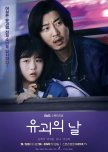
The two leads form a splendidly unique mixture, providing unique heartbeat and appeal to the story
“The Kidnapping Day” is all about its two great protagonists. I'm tempted to say: it is about the female lead character. The actress is simply wonderful and perfect for this character. Nevertheless, in my opinion, in her eccentric role she comes into her own so brilliantly precisely because her adult counterpart: the Kidnapper, who is just the way he is – as a rather clumsy person, he is practically the antithesis of this cheeky eleven-year-old but highly intelligent know-it-all. Yet, he ist the one who is sort of seeing, liberating and nurturing her usually neglected self, that is hidden underneath her intellectual brilliance: First of all she is just a child with all needs that come along. So, he might be not as smart as the little girl, yet he is actually the true grown up, who is not letting him be mislead by her genius, but watching out for her and intuitively caring for the child she is, too. This splendid mixture provides the unique heartbeat and appeal. So together they form this edgy team, keeping the audience in a good mood.The plot offers a lot of humor and quite some comicalness of the situation, but there are also serious themes lingering. After all, there is an unsolved murder case. Furthermore, it is nevertheless a case of kidnapping, even if the prefix may change over time. Added to this is the sad fact that health is often a question of money. And ultimately, behind all of this, there is also the issue of abuse. “The Kidnapping Day” is also able to tackle the ever late-breaking topic of “education hype in South Korea” in an original new way, entangling it in an exciting crime thriller.
What initially starts as kidnapping quickly takes a completely different direction. The victim becomes the mastermind. The police, or at least one of the investigators, dares to think twice and appropriately take unusual paths according this unusual case. Good and evil, black and white, its blurred. Yet, there are still unscrupulous villains. We are also stumbling over complex enmeshments, lying way back in the past.
“The Kidnapping Day” knows how to deliver on a variety of levels. Accordingly, the number of viewers has more than doubled over those 12 episodes. The special charm of the two leads also got me and I was happy to stick with them. Mind you, this was basically because of the charming relationship dynamics of the two leads, and how the two shape the kidnapping scenario along the way in a pleasantly witty way, including the solving of the murder case and at last providing a solution .
P.S.
The two protagonists, their particular relationship, THAT is the clever strength and the endearing piquancy. The rest might at times come across rather careless and pallid. Obviously, this is (once more) the product of the new era that has dawned in the KDrama orbit. Numerous new networks are now happily playing along on the market, including ENA, former SKY, which has repositioned itself in 2022 in order to get involved with its own KDrama productions in the top Pay-TV segment. (ENA belongs to Korean Telekom and produced 22 series in 2023 already.)
In general, with Disney, Netflix and others, I´d say KDrama productions feel like having doubled in 2023 (I didn't count, though). But what seems like a blessing at first sight turns out to be a bit of a sham, too. Where are all the original ideas supposed to continuously come from? And if there is a promising plot idea, it is yet far from being thoroughly worked through... Quantity rarely automatically goes hand in hand with quality. And it doesn't work the other way around either. Accordingly, “The Kidnapping Day” also suffers from the ravages of time: negligence can be observed here and there. However, the main strength and driving force of this story - the strangely lovingly developing relationship of the two unconventional leads - luckily is awesome enough to carry and equilibrate.

Brutal, merciless milieu of gangs & drug cartels. Stirring, gloomy but with soulful strings, too
What a positive surprise. For all those who are not afraid of the brutal, merciless milieu of gang wars and drug cartels: "Worst of Evil" offers intense characters with dynamic profiles, especially of the two protagonists - the rural police officer who joins a new Gangnam gang as an undercover agent, to help uncover the organized drug trade between China, South Korea and Japan, as well as the boss of that Gangnam gang.In particular, Ji Chang-wook as Park Jun-mo alias Kwon Seung-ho puts his heart and soul as well as quite some muscles and fighting into it. Whatsoever, he is impressive. But so are the others. It´s well cast and Disney+ apparently didn't skimp on anything...
For me personally, gang stories like this one aren't really my first choice. Too much crude violence, too much highly concentrated testosterone... "Worst of Evil" is no exception. Sharp blades and baseball bats are in high demand, especially in the first half. Nicotine seemingly acts as nutrition and even the fanciest suits can't hide the fact that a lot of blood is being shed unscrupulously...
Nonetheless.
“Worst of Evil” features complex characters and highly explosive relationship dynamics that is touching, gripping and, more importantly, provides emotional substance, too.
Eventually, undercover operations are psychologically demanding. The boundaries between true and false identity are blurring. A solid compass for right and wrong can easily be lost. The reality of living the undercover life creates new truths in which even the 'false' identity becomes a ´true´ part of one's own life. Coming to terms with this obviously is not easy. The return to the old life as it was before, even less so. In the case of "Worst of Evil", these internal and external conflicts of our undercover investigator become even more difficult by the fact that his wife has a history with the gang boss that he knew nothing about. She, his wife, herself a police officer and officially not ´his´ wife in terms of the new undercover identity, is now drawn into current affairs in a way that the small special investigation team could not have foreseen.
Not to mention the fact that the drug cartels involves powerful partners, not only in South Korea, but also in China and Japan. At last, the homicide police also get involved in dealing with everyday gang activities and murder cases in Gangnam. None of those involved is squeamish whatsoever. So danger lingers everywhere. Not only fists and fights, but also intelligent, diplomatic solutions are required. High-end improvisation is on the agenda for our hero.
"Worst of Evil" is thrilling, stirring, gloomy and – despite all the blood that boils over and over again (and all the copious amounts that are spilled) – it has its soulful strings, too. It's about trust, loyalty, bromance, the relativity of 'right' and 'wrong', and ultimately the ethical question of which end justifies which means...
Is the story predictable? Well, I can't fully deny that. But in "Worst of Evil" the journey is clearly the destination - what the undercover special operation DOES with this once "mother-in-law's favorite" and how he comes to terms with it. In addition, his counterpart, the self-proclaimed, brash, brilliant gang leader, is also quite interesting. With his vita, his goals and desires, he doesn't really fit into the usual cliché and thus brings additional dynamism. In addition, several other characters in the cartel (and police) environment impress with strong profiles, too.
As I said, I was pleasantly surprised. "Worst of Evil" had me. It's pretty well made all around and has actually more to offer than just ruthless gangs and action. (Nevertheless, be prepared, it still is about the milieu of ruthless gangs...)

A love story, that is told in a completely unorthodox way. Impressive in a refined manner
Capturing so much feeling quite sensitively and lifelike, “Remember you” is definitely for KMovie connoisseurs - with a memorable story and two wonderful leads deeply touching the audience's soul.However, the story is not at all concerned with meeting common audience expectations. The KMovie chooses its own pace while poetically linking the loose threads into a three-dimensional pattern – in a stringent but by no means linear manner, purposefully but without any haste.
“Remember you” (or rather “Don’t forget me”, as the original title says) is mostly a love story through and through. However, it is a love story, that is told in a completely unorthodox way.
The past that lies behind – with the memory of it having the potential to ripping emotional abysses with brute force. The future, that lies ahead – with hope dwelling inside. The present – in which the ´now´ can become a safe zone. Within and throughout: the transcendent power of love.
There is something meditative about “Remember You”. We´re stumbling alongside the amnesiac protagonist through his (to him) strange present, with people coming and going. It almost feels like in a dream. He acts on the outside while inwardly commenting and silently asking his questions to an inner authority that should know... But the inner authority is mute.
The memories of the male protagonist, who suffers from amnesia, come back in fragments and immediately collapse again. The soul has found its own ways in dealing in a somewhat more bearable way with an almost unbearable reality. But ultimately, this situation, too, still is not really bearable either. The KMovie portrays a desperate psychological wrestling with reality - of the male lead on the one hand, and the female lead on the other.
Before we notice it, at the latest as soon as the puzzle has been put together, we suddenly find ourselves very close to the no less desperate inner world of the female lead. After being very close to HIM for so long and learning to feel with HIM, we suddenly find ourselves compassionate with HER emotional horror trip...
Impressive in a refined manner!
PS:
The KMovie “Remember You” is based on a short film by the same director. Based on this template, crowdfunding was used to raise funds for an international independent cinema film production. $32,000 was donated for this purpose. When it premiered in South Korea, “Remember You” grossed around $2 million already.
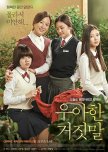
Fantastic, the (red) thread - in every respect.
I have been reading only positive critiques about “Thread of Lies” all over the place. It just took a while before I could see the KMovie for myself. Basically, all the praise has already been said. Nonetheless! The story, which is sad in itself, is told, staged and acted in just such a wonderfully clever way! Despite the seriousness of its topic, the basic attitude is positive and light. The complex and complicated underlying social and emotional mechanisms are so sensitively identified and processed, I can't help but find words of praise for "Thread of Lies" myself, too! Absolutely worth seeing! The characters, their motives and backgrounds, their conflicting feelings, the gray in the shadow, the light in the darkness, everything comes across as multidimensional authenticity.The older sister sets out to find out the actual reasons for the suicide of her younger, 14-year-old sister. We with her. There are traces – Suspicion. Culprit. Fault. Shame. As far as the eye can see... ...including the look in the mirror. Yet, it is not the index finger being raised. Rather, there is a hand, valiantly reaching out. Powerful!
It is not about accusation and blame or justification and defense. It is like it is. It was what it was. Recognizing THAT for what it is. Not sugarcoating it. No excuses. Recognizing each individual’s own contribution to some tragedy. It's all about this. To learn something out of it? In the best case!
In this KDrama, bullying (or mobbing) comes without bloody beatings and physical violence. Rather, it is the psychological, manipulative, nastily hidden, difficult-to-understand social-emotional mechanisms that are elaborated in an extremely sensitive, comprehensible way. A girl is forced into inner isolation at an age when the peer group actually becomes more important than family. Friendship, dependence, abuse - the boundaries are not yet so clear. When it comes to that, the young are still 'children' – perhaps with high ideals already, but still without lived friendship-experience. Friendship is a word with deep meaning, a powerful concept. It is related to high hopes and yearnings. It is needed, in order to survive in this world.
In contrast, there are parents who know better and still duck away. There are bullying victims who somehow survived. Also parents, who are absorbed in their own world. And in the middle of it all, a young girl says goodbye to this world. Decided and definite. Yet at the same time hesitant, too. Desperate after all. Helpless. A 14-year-old says goodbye to a world in which the only one, who knew about how she truly felt, was a stranger...
The complex story is processed in a non-linear manner. Compact and yet differentiated. The tragedy of the unspectacular is intensified by a rather subtly developed arc suspension. Touching, but not told in an overly emotional way. And what can I say... the story unfolds in such a true to life manner that you can't even be angry with the venomous perpetrator. At least not as much as you would like...
Fantastic, the (red) thread - in every respect.
PS:
The story is based on the novel “Elegant Lies” by Kim Ryeo-ryeong in 2009. Actually, the film production had a rather low budget and its initial difficulties to get started, as the topic is considered highly sensitive, especially in South Korea. The KMovie, however, gave the lie to the doubters. The response was enormous and consistently positive.
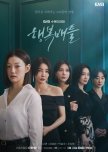
Despite all the catfights there is a deeper grounding to the story. Intelligent. Emotional. Opaque.
"Battle for Happiness" is based on a novel, the author herself having written the script for its KDrama version on PayTV, too. The story offers refreshing substance - with insight into honest emotional worlds underneath a shimmering dishonest surface. Powerful, intense women, who also have their sore, hidden wounds, shaping a surprisingly powerful story. Hats off!The story is set in the elite world of elite Gangnam mothers in the elite (fictional) Gangnam housing block Herinity. But even though the ladies may have made it into the upper league of society by marrying a lawyer or doctor or having wealth in some other way, they are still far from happy - even if they do almost everything to make it look as if...
Perhaps one could say that the KDrama is (again) a reckoning with the dubious concept that gives preference to the radiant, shimmering external appearance over truthful, sincere substance. But that's quite abstract. Actually, “Battle for Happiness” is rather precise. The battles are taking place in the mud of the protagonists' hidden secrets and weaknesses. That is dirty. That is mean. That is malicious. That is cruel. But that's what the life of those Gangnam mothers is all about. The societal backdrop is characterized by the overall social pressure to perform and compete for pole position in the race for the top spots in the social pyramid. But this is actually just the backdrop. It's actually less about the children. They are ornaments of their mothers. The mothers, on the other hand, are in the spotlight - wealthy, frighteningly powerful, influential women. Vulnerable people, nonetheless.
Admittedly, at the beginning I was tempted drop – those bitches! So false, so dishonest, so calculating, it was almost unbearable... The social media in their function, to spice up one´s own life a little more gloriously on the outside, are elaborately integrated into the overall dramaturgical structure. However, I stuck with “Battle for Happiness” because despite all the catfights there is a deeper grounding to the story, whose charisma can eventually fully unfold.
In fact, I'm glad I stuck with it, because the story offers an exciting rollercoaster ride of assumptions and suspicions. "Battle of Happiness" suddenly turns out to be a captivating crime thriller in which an inconspicuous private person takes the investigation into her own (unexperienced and sometimes naïve, impulsive) hands. Yet, even more appealing to me is the naturalness in which this KDrama gives a hand for compassion - even with the worst of the she-devils: the lady, who as the incarnated princess of hell in designer clothes initially got people´s minds running wild...
It´s the ladies, who rock the show. They are mothers, wives or single. In any case, you can't get past them. And they, for their part, cannot avoid facing their own sore wounds, which are catching up with them one by one. We consistently dig deeper into the hidden emotional worlds of those women (plus also a couple of men and some children). They must face their personal emotional battles, even if they don´t want to. In the best case scenario, they become their actual battles for happiness, as they lead to their very personal questions and truths - what is REALLY crucial in my life?
There is a dubious mathematical equation circulating among those ladies that goes something like this: 'The amount of misfortune I cause someone else becomes a factor for my personal happiness.' Well, even if I'm myself not great at math: If you multiply whatsoever by zero, as far as I know, zero still remains, isn´t it... So eventually, those ladies are forced to work on THIS point in the equation (the zero!)...
...and some of them actually take advantage of this opportunity as an outsider penetrates the aloof world of the Gangnam ladies. One, who doesn't think much of all the elitist concepts of happiness and competition, but instead innocently keeps looking for the perpetrator.
I wouldn't have thought so at first, but in my opinion "Battle of Happiness" is clearly one of the better, more substantial productions that 2023 has to offer so far. Comparisons with existing KDrama productions that are set in a similar milieu and/or wade in the mud of the glittering elite may perhaps come to mind. But "Battle of Happiness" tells its own story! And in my opinion it is definitely worth watching. (...if you are not looking for Romance or Oppas or Comedy…)
Most of us may never get near such exclusive worlds. However, wanting to fool others (and ourselves), feeling better when others are feeling worse, sometimes doing something to others that we wouldn't want to be done to yourself... hardly anyone might be immune to these human impulses. If we take away the exclusive luxury world, from which many may easily distance themselves, then we're still left with the beastly temptation that may linger in all of us. Maybe/hopefully we just don't let the beast in us out of the bag so uninhibitedly...
So I could summarize: I appreciate the intelligent, yet still highly emotional approach and the opaque processing of those different relationship dynamics between the protagonists.
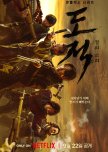
Captivating. Cinematic. Action-packed, yet offering impressive quiet & heartwarming tuning, too
Gando is the land of the desperate, the realm of the desperados of Joseon. In the 1920s, it was also a territory in which political responsibilities and affiliations were vaguely regulated. Some things may remind you of the Wild West. Yet this Wild North in the Far East is quite different...“Song of the Bandits” is a brilliant Netflix historical drama about a certain chapter of recent Korean history. Moving. Captivating. Cinematic. It exudes the vibes of an Eastern. The KDrama surely is gory action and turbulence at most times, but offers impressive quiet and heartwarming tuning, too. Action-packed it is, yet humor and romance modestly fit in as well. "Song of the Bandits" is astonishingly well balanced in this respect and for a Netflix production, despite its polished and action-driven choreography for a broad international audience, sticks surprisingly consistently to a more subtle Korean series style. Nicely done at all scales. We get a feeling of the Manchurian landscape with Gando impressions filmed at original locations. This all framed within a consistently beautiful soundtrack. It all lasts for 9 episodes (only! Yet?). In spite the overall ambitious commercial production context, aiming at an international “Squid Game”-like success, “Song of the Bandits” was able to impress me with a historically and emotionally complex story with great mimes - Kim Nam-gil, Yoo Jae-myung, Lee Ho-jung and Lee Hyun-wook in their element. But so is everyone else. This is where KDrama and Netflix perfectly come together...
'Bandit: The Song of the Sword' is the original title. In fact, people don't swing swords so much as they use firearms. The KDrama is epically processed, offers great emotions, while telling about people and the range of motives for which people are prepared to fight. It's about resistance, obedience, venality, oppression, social affiliation, the fight for freedom. There are even some spiritual thoughts attached to it along the way. It is about the Joseon people, some personal fate, as well as 'the' history of Chosen - an emotionally quite ´Korean´ excerpt of modern history. Its thematic historic setting (even if the rest of the world might not care so much about it, as it is not requisite for an entertaining series pleasure) contains a lot of explosive material by Korean standards. Therefore firearms are in several respects quite consistent in this context…
As far as I am concerned, I do care about the historical context. On the contrary, I find it quite intriguing - besides the dramaturgically action-packed and emotionally charged story with its complex, interwoven relationship dynamics and conflicts. As I said, you don't really need to know the background to be enthusiastic about "Song of the Bandits". But if anyone might be interested, see the historical side note about 'Gando', the border region on the north bank of the Tumen river, which today also marks the border between northeast China and North Korea.
PS:
Yep, the ending of the story...
If you like, you can dream of more. It could be possible. Yet, it would still go on and on.
Who knows if there may be a sequel...
Nevertheless, from my perspective the ending is quite fitting. (Whether I like it or not.) In terms of the historical events, things are as they are. We want fiction to write a different ending, but it still wouldn´t be any better, rosier or brighter for hardly any of the various protagonists... Therefore, from a Korean perspective the ending of this story remains true to the spirit of the actual Chosen-history: For Joseon people it is and remains unsatisfactory, unfair and painful. ´We´, as an international audience (temporarily and figuratively with our personal discontent), can/shall/must/may thus empathically share this collective emotion, too.
-----------------------------------------------------------------------
SIDE NOTE: --- Gando, also called Jiandao, and today Yanbian ---
Gando historically stands for a specific borderland. To this day it is a region with a high proportion of people of Korean origin.
Gando is a small, perhaps inconspicuous scar in Korean history – yet a scar that is still weeping, sort of...
Gando (and Manchuria in general) is also associated with the regrouping of the Rightous Army and thus with the patriotic pride of resistance against colonial oppression. With "Song of the Bandits", the issue of Gando has now obtained an impressive, international onstage introduction...
This 'Gando', Jiandao or Yanbian was the last nail of hope for an increasing number of desperate people from Joseon (and still is for some North Koreans today) who had nothing to lose and would rather settle for an arduous life and try their luck in this section of Manchuria - a back then relatively undeveloped marshland on the north bank of the Tumen river.
First - in the course of, and especially at the end of, the 19th century - famine and poverty drove poor Joseon people to the far north. Then, at the beginning of the 20th century, it was the hope to escape from Chosen, which was finally officially annexed by the Japanese. The Righteous Army militia was also formed anew in Manchuria at that time.
After the annexation of Joseon, with respect to a relatively large population of Joseon people, the Japanese as part of their aggressive expansion efforts also demanded this coastal territory north of the Tumen from the Chinese. Infiltration was followed by an invasion in 1907, but already by 1909 there was withdrawal again. Officially, as a result of the diplomatic negotiations, the area eventually became Chinese again and Japan received railroad concessions, while the Joseon people remained under Japanese rule due to their Korean descent.
"Song of the Bandits" sets its story in this political quagmire: the decade before the belligerent 1930s, before the Empire of Japan invaded Manchuria, established the puppet state 'Mandschukuo' and used it for its own political and economic purposes. The prerequisite for this was a massive expansion of railway lines - especially the North Chosen Line along the border region between Chosen and Manchuria, that had been built during those previous years, while the Bandits sang their song...
Outlook:
After the end of the Second World War, many Koreans went back to their homeland, but by no means all of them. Around 810,000 people of Korean origin apparently still live in the Yanbian Autonomous District of China's Jilin Province to this day. In 1952, the proportion of the population with a Korean migrant background was around 60 percent. Then, Korean language was official. However, especially since the late 1990s, the Chinese government had specifically tried to force linguistic and cultural assimilation in order to counteract political currents in South Korea and discussions about a possible legitimate Korean claim to 'Gando'. These currents believe that - regarding those dubious events of the early 20th century and Gando Convention between Japan and China becoming obsolete with the ending of the World War II – this Gando territory actually is political void and should now belong to (in this case North?) Korea. Thus, Gando's territorial status for some still is not satisfactorily resolved…
Incidentally, desperate North Korean refugees are continuously trying to get to China via the Tumen river, which is icy during the long, cold winter months. Thus, Gando territory invariably remains a last nail of hope for desperate Koreans even up until today...

A blockbuster among Disney+ Series. Action driven, yet luckily with subtle character portraits, too
"Moving" is about people with superpowers. “Moving” tells the stories of a variety of people with such superpowers. These superpowers definitely belong to the realm of fantasy. However, it´s nothing like the 'Marvel' universe, because despite all the action spectacle that "Moving" has to offer, this Disney+ production (based on a successful South Korean webtoon) remains true to the KDrama habitus, that life takes place in the area BETWEEN black and white. It's about shades of gray. Nobody is exclusively good or evil. Well, almost nobody...“Moving” takes aim at South Korea’s intelligence policy. The KCIA, which became the ANSP and was eventually called the NIS. The connections with the USA and the difficult relationship with North Korea come into play. Difficult, because even within the framework of an official sunshine policy, distrust and hostility are always maintained in the background.
The South Korean secret service has been part of the international elite since the KCIA was founded. The superpowers of the protagonists may be symbolic of this. The name of the secret service has changed several times, as has its official focus. However, this does not mean that the entire workforce can be replaced...
“Moving” finds its balance between political thriller, action thriller and emotionally differentiated Korean habitus. The trick: the tough agents become humanly tangible because they are also parents, worried about their children. And then another trick: the children have inherited their parents' super-powers, but have not (yet) undergone any agent programming. They are children, still relatively naive, pubescent, too...
Worlds collide. The worlds of those, who behind the curtain want to move the world in their favor (for the sake of so called bigger picture and a safer world), the worlds of those executives, more or less blindly obedient (Black Ops) agents who are needed to succeed with their missions, and the world of those, who actually make this world worth living - people with their ordinary families and social relationships.
“Moving” has 20 episodes. Numerous character and relationship portraits are drawn, all of which are somehow intertwined - the old and the young, yesterday and today. And finally altogether now for a tomorrow free from deadly intelligence agency demands.
“Moving” is, first and foremost, a KDrama with a top-class casting that aims to offer streaming delight at the highest international level. “Moving” is explicitly seen as a kind of blockbuster among Disney+ series productions - with a correspondingly hefty budget. As such, the series has entered the streaming market in a self-assured manner and immediately achieved remarkable success worldwide...
However, for my personal taste, this KDrama comes across as a bit too action driven and brutal - with those superpowerful men and women, who (despite their deadly wounds) keep bouncing back again and again and again... I might have dropped it, if not for this variety of subtle and affectionate character portraits, that make a great part of the story, too.
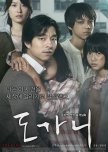
Outstanding KMovie. Daunting. Blunt. Galvanizing. Impressively staged. Yet rather painful to watch
"Silenced" is a 2011 movie production. The KMovie is based on a book and this in turn is based on a true story that happened at Gwangju Inhwa School. For a change, it's not about bullying among students, but about repeated sexual abuse by teachers and school staff against their underage wards. In this case they were also deaf."Silenced" is an outstanding, moving film production - in several respects.
The story is impressively staged.
Horrendous abuse. Repulsive in its unbelievable brutality. Blunt.
There are the children left at the mercy of pitiless adults, left alone in their helplessness - speechless in every respect. What else can they hope for in this world?
There are the adults - the perpetrators and also those who knowingly close their eyes to injustice for their own benefit. (I have no idea what they do with their ears and their conscience, though...)
And there are the two protagonists - neither of them exactly the epitome of promising heroes...
With a top-class Gong Yoo, who personally and actively supported the filming of the story. He read the book during his military service. But it was only later that he found out that these were true events. He met with the author and the idea for the film was born. He embodies the main role of the initially quiet, perhaps somewhat wimpy, indecisive teacher; a widower and a father who is absent due to his job and who relies on his mother's support to look after his sick daughter. Yet, it is precisely this tangible, silently screaming human weakness of his character, his uncertainty in dealing with the unfathomable, his own initial shock of cautious, perhaps naive reserve that contributes to the authentic strength of the KMovie. (If the world were full of determined, courageous heroes, then there would be less such terrible incidents, repeatedly taking place over the years with impunity - like those in that South Korean boarding school for the deaf in Gwangju...or that Odenwaldschule in Germany, or far too many other schools worldwide.) The heroic in our protagonist must first be born and then grow. This is a process. Step by step, stumbling, helpless, hopeful and yet again discouraged, but then unbendingly getting up again - and finally on a path of no return...
The KMovie “Silence” is shocking.
Grim. At times it may be reminiscent of a horror movie like 'The Shining' or something similar. The story is daunting. Its social dimensions are sobering. There are hardly any words for this parallel world. What people are monstrously capable of... and then also: that time and again, in the face of blatant injustice, people let themselves be bought and silenced for their own benefit.
Nevertheless, the message at the end is (I think) quite wonderful: "...it makes me think, that the reason we are fighting so hard is not to change the world, but instead to not let the world change us." Resistance takes on an encouraging new dimension that doesn't have to give in, even in the face of a Goliath. Great!
The KMovie was and is galvanizing.
“Silenced” shook up the masses in 2011 in a spectacular way. Over 4 million horrified cinemagoers saw the movie, which was number 1 on the South Korean cinema charts for three weeks in a row. The book by Gong Ji-young was storming the bestseller lists.
What the regular jurisprudence was previously unable to do was actually subsequently made possible by the pressure of the shocked masses: 1.5 months after the KMovie was first broadcast, the so-called 'Dogani Law' was passed. (Dogani = "Crucible", the title of the book and film). Since then, the new law has suspended the statute of limitations for sexual abuse of people with disabilities and for rape of minors under the age of 13.
Therefore, some of the perpetrators at that school in Gwangju who had previously gotten off with lax sentences were subsequently summoned again and sentenced to long prison terms and/or electronic ankle bracelets.
Lastly, at least THIS school was closed.
Respect!
For taking up the issue.
For not giving up and thus using other means (a movie on the big screen).
For the sensitive handling of a tough topic.
For the often extremely unpleasant, painful, however nevertheless coherent film adaptation of a fantastic script.
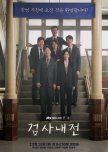
Authentic! The people, the stories, the setting. Affectionate, humorous & true to life characters
"Diary of a Prosecutor" is an extremely delightful, unconventional and, despite all the sometimes snappy, sometimes cheerful, sometimes pitch black, sometimes heartful humor, it also offers a quite serious, profound examination of jurisdiction and practically handling the law. This embedded in the simple everyday work-life of ordinary people, told from the perspective of a provincial prosecutor. The script is based on the essay "Civil War Prosecutor", written by a real prosecutor and inspired by his personal experiences.So it is primarily about the everyday life on the office floors and behind the office doors of the public prosecutor's office. First and foremost, this is about profane workdays that often last until late, including dinner and drinks with colleagues. However, this is also about a noble task, the juggling with legal regulations, the ideals of a just society and the diplomatic basics in dealing with superiors in the strict hierarchy from the bottom to the top. And last but not least, this is a potpourri of different individual stories of quite ordinary people who face the challenges of their inconspicuous lives every day anew, and eventually grow from them - as it is in life...
In other words, you get: a variety of people you grow fond of as you get to know them better; a job-portrait that is subject to the highest expectations, but whose credibility in the country is still not easy. And a (fictional) outskirts - a town at the seaside, famous for its oyster harvest. The filming took place in Tonyeong-si in the very south of the country, where practically the entire crew (around 150 people, including cast) stayed during the five-month shooting period... Provincial life is thus breathing from every pore of the KDrama - everything is a bit more relaxed, closer to nature. Seoul is far away…
Conclusion: Authentic! The people, the stories, the setting. The dramaturgical 'trick': the greater narrative of the omniscient narrator. The humor that comes along with it. Sometimes ironic, sometimes satirical, sometimes bone dry. Bottom line: funny and complex at the same time. Affectionate, humorous and true to life personality portraits. In script and play. The cases and the ethical questions involved go deep at times. And yet it is people who deal with it. Colleagues. Eventually in competition at times. Imperfect people, with weaknesses, even if they wear robes. Yet, people who can excel themselves at times, too. Other than that, the days, weeks, months and years go by, case after case, team dinner after team dinner...
As far as Korean life and culture is concerned, with this KDrama you can get pretty close to the people and their everyday world in many ways. Because of this and a wonderful overall concept, whose good spirit works on all scales, I consider “Diary of a Prosecutor” highly valuable.
Maybe it's a bit unusual at first. Don't let it irritate you. Keep going. I´d say it is worth it...
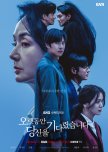
A fancy, unusual treat for crime thriller fans
"Longing for You" offers crime and more at its best. Nice to have along the way: a bit of salt in the fresh air of the coastal town where two of the protagonists grew up in.The public prosecutor's office and the police form a special investigation unit in the case of a serial killer. Solving the case is one thing - an that is overrun by further victims. The internal dynamics within the team as well as emotional complications between further characters are another. Both crime case and complex personal dynamics being jointly combined within a splendidly explosive mixture make “Longing for You” a fancy, unusual treat for crime thriller fans.
We abruptly stumble into an opaque spider's web. The KDrama thrives on its bizarre, strangely interwoven relationships. Abyssal. A bit chilly at times. Mostly harsh and brusque. But sensitive and touching in well-placed spots, too. Suspenseful until the end. Whenever you think you have a clue, the story takes a new, unexpected turn. As I said, a fancy, unusual treat for crime thriller fans.
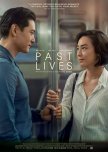
About a great service of love AKA a fateful, karmic relationship
"Past Lives" is a US production. Both the author and the two 'Korean' leads have Korean roots, but they did NOT grow up in Korea, nor do they live there. The story is autobiographically inspired and is dramaturgically presented in authentic dialogues on the one hand and selected, visually impressive sets on the other. It is about the aspect of fate (and or Karma) in encounters as well as pondering platonic love. "Past Lives" is indulging into the emotional world of more or less accountable and sensitive reflection of the protagonists, especially of those two extraordinarily mature, fine young men. You rarely see that. Additionally, as far as camera work was concerned, light and perspectives were chosen with care and thus implemented as supplementary actor, sort of. All this is quite wonderful and has already been widely praised. “Past Lives” is thus a movie well worth seeing.This movie presents South Korea and an attitude towards South Korea through the eyes of a South Korean girl who during the 1990s emigrated with her family at the age of 12. She then grew up in Canada, tried her luck as a playwright in New York, married an American, received the green card as side effect, and is ambitiously seeking recognition and success as a writer today. “Past Loves” thus has its positive emphasis on life in the US. The protagonist´s family had turned their back on South Korea. However, besides everything else, that has been already mentioned all over the place, I would say, that "Past Lives" is actually indirectly, in a rather subtle, reserved, unobtrusive way, (almost overlooked and hidden underneath the shiny, promising dominance of the US,) about positive Korean specific qualities, too... Therefore…
Generally, “Past Lives" juxtaposes those two ´worlds´ rather dichotomously. THERE South Korea, the country of origin that was left behind - far away and rather in the background, in the camouflage colors of the military and surrounded by plenty of soju. HERE the USA - reduced to a highly stylized New York (and artist retreat on Long Island), that is bathing in beautiful light and selected colors. In several respects, the United States is presented as the unrivalled better choice.
However, we experience these worlds through the eyes of the protagonist. In Nora's eyes, South Korea stands for conservative narrow mindedness, constraints, lack of freedom (which to some extend is certainly true). The USA, on the other hand, for her is the symbol for freedom, creative power, partake (should, could, might as well…). Eventually, those world views turn upside down. These are prejudicial concepts, both of which are not generally correct, e.g. each not representing the whole truth.
So, KOREAN normal everyday life is portrayed as conservative, shaped by her parents perspective and Nora's childhood impressions of the 1990s: the young democracy, already economically shaken by the Asian crisis. Her parents were artists and as such one way or another most probably influenced by the shaky turbulences of pro-democracy movement of the 1980s. They wanted a fresh start. Yet, what remains in Nora's memories? Very vague memories of school days, of what was said at home, of the striking images that remain impressively to this day. Bottom line: 'Men have to do their military service.' 'People are conservative and unsophisticated.' 'Men dependently live at their parents´ home until marriage.´ ´You can´t proceed in life.´
On the other hand, NORTH AMERICA is the much-cited world of unimagined possibilities. For Nora specifically, it is about a liberal world for the arts. She´s dreaming about her successful future, while the ambitious daughter may actually be living a much wanted life in lieu of her parents, too, to a certain extent. However, this ambitious dream is symbolically captured as an aesthetically abstract decal of New York and the Montauk artist retreat. For Nora, the USA represent a possibility to fulfil her dream of international prizes as an author. Thus, the USA as the center of her life is uncompromising and practically non-negotiable. That's okay and understandable.
This South Korea in the movie has a strong touch of Nora´s own prejudices. Apparently, she never emotionally processed or reflected her relationship to her country of origin. A deficit, which may also narrow down the perspective of the audience. Therefore, I would like to stand up for positive 'Korean merits', which only shine through subtly. In fact, though, they are formative for the characteristic poetic quality of the story. They come along in the person of Hae Sung. Thanks to him Nora can finally hold the key to her emotional freedom in her hands. (Whatever she may do with it now...) Thanks to Hae Sung (so to speak) she got her story and thus her tremendous success as a writer and director, too.
If you don't identify with Nora´s enthusiasm for the US so much, it might be easier to recognize those ´Korean merits´. Hae Sung actually embodies the opposite of what has settled in Nora's mind about South Korea. He stands for a new spirit among the digitalized young generation - even though he is an engineer. She, however, sees what she wants to see, reducing him to military service, close family ties, his clearly structured career and his reserved answers to her questions about marrying or rather not marrying his girlfriend.
Nora overlooks the fact that in his half-hearted answers about marital responsibility he carefully avoids generalizations so as not to overwhelm her with his feelings for her. She overlooks the fact that Hae Sung is indeed the courageous creator of his own world, possibly facing life even more creatively and openly than she dares herself. He chooses to study abroad in China because he wants to learn the language and because it may suit his career, too. He is ambitiously following his career plans, just like she does. Nevertheless, he is open to life´s challenges and ready to completely turn everything upside down. He is actively dealing with what is going on between the two. He prefers not to go for a logical, reasonable marriage. Instead, he takes what his heart tells him, seriously. He wants to sincerely check it out. This makes him vulnerable, too. Actually it was him, who originally went looking for Nora. With courageous creativity he took the chances life had to offer in his own hands. From a practical point of view, HE thought creatively and acted courageously. Nora on the other hand was the one, who, to a certain extent, simply unwinds her program without looking to the left or right.
Back then, when she left South Korea, she just put her feelings away, came up with a new name, learned the new language and left her best friend (and Korea) behind like an old toy. Since then her feelings for her old homeland only slumber unconsciously in her dreams. In her life, which is highly concentrated on her career as an artist, her past and origins have not been given the place they deserve. Hae Sung has to come first to open the door to that forgotten dungeon of her heart.
Still, we don't know whether Nora was able to take the 'little one' in herself by the healing hand - the 12-year-old Na Young, whom she had left alone in the past. All we know is that Hae Sung gave her a chance to reconcile with her roots and a hidden, almost forgotten part of herself. His great service of love was: not forgetting her, not giving up on her; looking out for her; meeting her, too; recognizing her for who she is; reminding her of something else, that she had almost forgotten; and finally letting her be - in an understanding, loving, respectful, ´Korean´ manner. Even if it hurts.
Actually, being himself, he represented another powerful aspect of South Korea, that Nora had so far not realized as such: A finely nuanced, rather emotionally dominated and yet respectful attitude towards life. This in contrast to a rather dichotomously shaped - black/white, good/bad, yes/no -, rather reasonable approach towards life, as it radiates from her 'North America'-concept.
At the heart of "Past Lives" is the probing of the protagonists' feelings for each other. What are those feelings supposed to be? Platonic maybe? Or more than that? And of course the story lives from the attraction of 'What if?'. This careful scanning of a space of potentiality is processed aesthetically cultivated, and stylishly. Respectfully too. Finally there are tears. ´Past Lives´ it is… However, the striking poetic aspect of this story is only made possible (in my opinion) by this very South Korean Hae Sung, who is not afraid to meet the multilayered complexity of emotional depth, confusing affection and difficult challenges in life, and (!) who is also not afraid to back off in respect to a larger context either. Thus he eventually even provided her on the silver platter of his heart with the so much longed for international artistic success...
PS:
Must be the 'In-yeon' they keep talking about throughout the movie...
--------------------------------------------------------
SIDE NOTE:
In-yeon = a fateful, karmic relationship
--------------------------------------------------------


 9
9 37
37 15
15


















